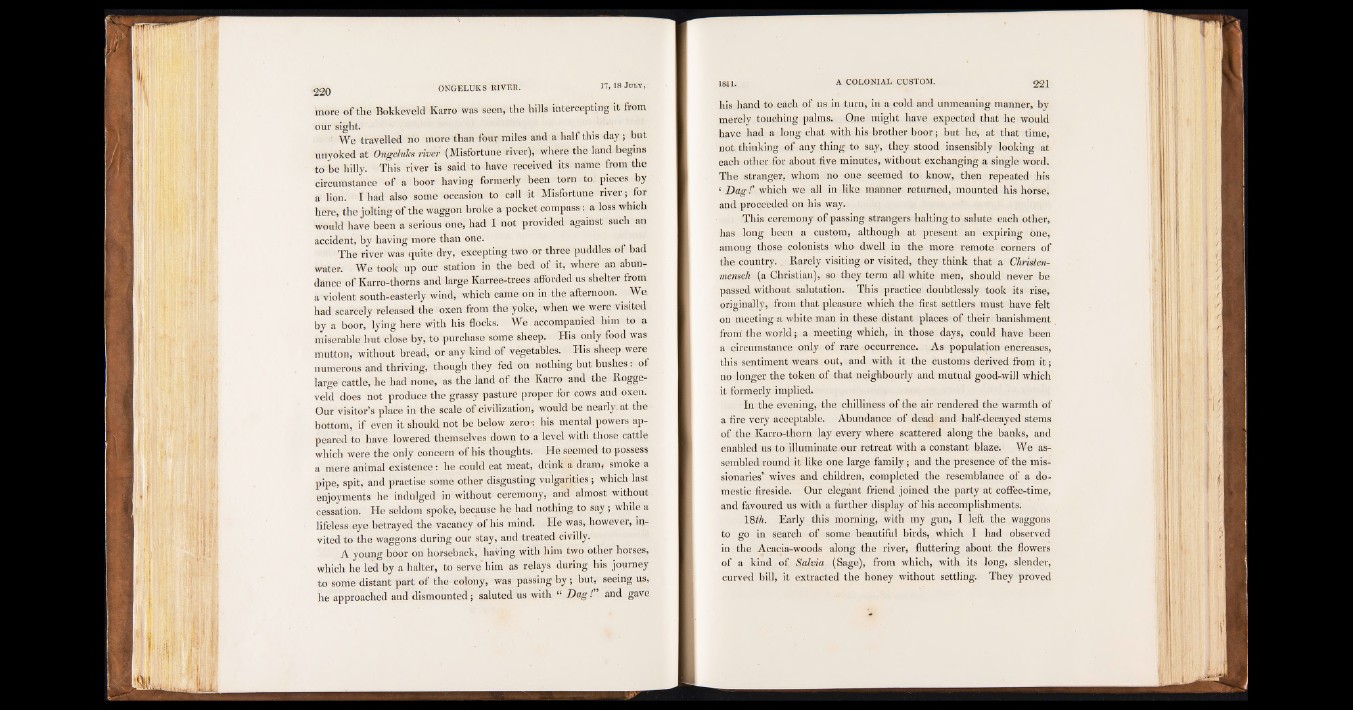
more of the Bokkeveld Karro was seen, the hills intercepting it from
our sight.
We travelled no more than four miles and a half this day; but
unyoked at Ongelulcs river (Misfortune river),, where the land begins
to be hilly. This river is said to have received its name from the
circumstance of a boor having formerly been torn to. pieces by
a lion. I had also some occasion to call it Misfortune river; for
here, the jolting of the waggon broke a pocket compass: a loss which
Would have been a serious one, had I not provided against such an
accident, by having more than one.
The river was quite dry, excepting two or three puddles of bad
water. We took up our station in the bed of it, where an abundance
of Karro-thorns and large Karree-trees afforded us shelter from
a violent south-easterly wind, which came on in the afternoon. We.
had scarcely released the oxen from the yoke, when we were visited
by a boor, lying here with his flocks. We accompanied him to a
miserable but close by, to purchase some sheep. His only food was
mutton, without bread, or any kind of vegetables. His sheep were
numerous and thriving, though they fed on nothing but bushes: of
large cattle, he had none, as the land of the Karro and the Rogge-
veld does not produce the grassy pasture proper for cows and oxen.
Our visitor’s place in the scale of civilization, would be nearly, at the
bottom, if even it should not be below zero-: his mental powers appeared
to have lowered themselves down to a level with those cattle
which were the only concern of his thoughts. He seemed to possess
a mere animal existence: he could eat meat, drink a drain, smoke a
pipe, spit, and practise some other disgusting vulgarities; which last
enjoyments he indulged in without ceremony, and almost without
cessation. He seldom spoke, because he had nothing, to say; while a
lifeless eye betrayed the vacancy of his mind. He was, however, invited
to the waggons during our stay, and treated civilly.
A young boor on horseback, having with him two other horses,
which he led by a halter, to serve him as relays during his journey
to some distant part of the colony, was passing by; but, seeing us,
he approached and dismounted; saluted us with “ D a g and gave
his hand to each of us in turn, in a cold and unmeaning manner, by
merely touching palms. One might have expected that he would
have had a long chat with his brother boor; but he, at that time;
not thinking of any thing to say, they stood insensibly looking at
each other for about five minutes, without exchanging a single word.
The stranger, whom no one seemed to know, then repeated his
1 Dag!’ which we all in like manner returned, mounted his horse,
and proceeded on his way.
This ceremony of passing strangers halting to salute each other,
has long been a custom, although at present an expiring one,
among those colonists who dwell in the more remote corners of
the country. . Rarely visiting or visited, they think that a Christen-
mensch (a Christian), so they term all white men, should never be
passed without salutation. This -practice doubtlessly took its rise,
originally, from that pleasure which the first settlers must have felt
on meeting a white man in these distant places of their banishment
from the world; a meeting which, in those days, could have been
a circumstance only of rare occurrence. As population encreases,
this sentiment wears out, and with it the customs derived from i t ;
no longer the token of that neighbourly and mutual good-will which
it formerly implied.
In the evening, the chilliness of the air rendered the warmth of
a fire very acceptable. Abundance of dead and half-decayed stems
of the Karro-thorn lay every where scattered along the banks, and
enabled us to illuminate.our retreat with a constant blaze. We assembled
round it like one large family; and the presence of the missionaries’
wives and children, completed the resemblance of a domestic
fireside. Our elegant friend joined the party at coffee-time,
and favoured us with a further display of his accomplishments.
18th. Early this morning, with my gun, I left the waggons
to go in search of some beautiful birds, which I had observed
in the Acacia-woods along the river, fluttering about the flowers
of a kind of. Salvia (Sage), from which, with its long, slender,
curved bill, it extracted the honey without settling. They proved